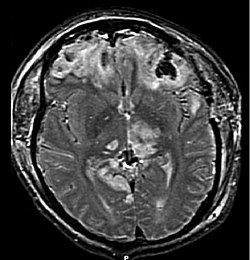Acquired brain injury
| Acquired brain injury | |
|---|---|

| |
| Synonyms | N/A |
| Pronounce | N/A |
| Specialty | N/A |
| Symptoms | Cognitive impairment, memory loss, emotional instability, physical disabilities |
| Complications | Seizures, chronic pain, depression, anxiety |
| Onset | Sudden or gradual, depending on cause |
| Duration | Long-term, often lifelong |
| Types | Traumatic brain injury, stroke, anoxic brain injury, infection |
| Causes | Trauma, stroke, infection, hypoxia |
| Risks | Falls, motor vehicle accidents, sports injuries, assault |
| Diagnosis | Neuroimaging, neurological examination, cognitive testing |
| Differential diagnosis | N/A |
| Prevention | N/A |
| Treatment | Rehabilitation, medication, surgery, therapy |
| Medication | N/A |
| Prognosis | Varies; depends on severity and location of injury |
| Frequency | Common; varies by population and region |
| Deaths | N/A |
Acquired brain injury
Acquired brain injury (ABI) refers to any type of brain damage that occurs after birth. This can result from a variety of causes, including trauma, infection, or disease. Unlike congenital brain injuries, which are present at birth, acquired brain injuries occur later in life and can have a significant impact on an individual's cognitive, physical, emotional, and behavioral functioning.
Causes
Acquired brain injuries can be caused by a number of factors, including:
- Traumatic brain injury (TBI) - caused by an external force, such as a blow to the head.
- Stroke - occurs when the blood supply to part of the brain is interrupted or reduced.
- Infection - such as meningitis or encephalitis.
- Tumor - growth of abnormal cells in the brain.
- Hypoxia - lack of oxygen to the brain, which can occur during events such as drowning or cardiac arrest.
- Toxic exposure - exposure to harmful substances, such as carbon monoxide or lead.
Symptoms
The symptoms of an acquired brain injury can vary widely depending on the severity and location of the injury. Common symptoms include:
- Cognitive impairments, such as difficulties with memory, attention, and problem-solving.
- Physical symptoms, such as headaches, dizziness, and motor impairments.
- Emotional and behavioral changes, such as mood swings, depression, and irritability.
- Sensory problems, such as changes in vision, hearing, or sensation.
Diagnosis
Diagnosis of an acquired brain injury typically involves a combination of medical history, physical examination, and imaging studies such as MRI or CT scan. Neuropsychological testing may also be used to assess cognitive function and identify specific areas of impairment.
Treatment
Treatment for acquired brain injury is often multidisciplinary and may include:
- Rehabilitation therapies, such as physical therapy, occupational therapy, and speech therapy.
- Medications to manage symptoms such as pain, depression, or seizures.
- Psychological support and counseling to help cope with emotional and behavioral changes.
- Assistive devices and technologies to aid in daily functioning.
Prognosis
The prognosis for individuals with an acquired brain injury varies widely and depends on factors such as the cause and severity of the injury, the age and health of the individual, and the timeliness and effectiveness of treatment. Some individuals may experience significant recovery, while others may have long-term disabilities.
Historical Cases
One of the most famous historical cases of acquired brain injury is that of Phineas Gage, a railroad construction foreman who survived a severe brain injury in 1848. Gage's case provided early evidence of the relationship between brain injury and changes in personality and behavior.
Related pages
Acquired_brain_injury
Transform your life with W8MD's budget GLP-1 injections from $125.
W8MD offers a medical weight loss program to lose weight in Philadelphia. Our physician-supervised medical weight loss provides:
- Most insurances accepted or discounted self-pay rates. We will obtain insurance prior authorizations if needed.
- Generic GLP1 weight loss injections from $125 for the starting dose.
- Also offer prescription weight loss medications including Phentermine, Qsymia, Diethylpropion, Contrave etc.
NYC weight loss doctor appointments
Start your NYC weight loss journey today at our NYC medical weight loss and Philadelphia medical weight loss clinics.
- Call 718-946-5500 to lose weight in NYC or for medical weight loss in Philadelphia 215-676-2334.
- Tags:NYC medical weight loss, Philadelphia lose weight Zepbound NYC, Budget GLP1 weight loss injections, Wegovy Philadelphia, Wegovy NYC, Philadelphia medical weight loss, Brookly weight loss and Wegovy NYC
|
WikiMD's Wellness Encyclopedia |
| Let Food Be Thy Medicine Medicine Thy Food - Hippocrates |
Medical Disclaimer: WikiMD is not a substitute for professional medical advice. The information on WikiMD is provided as an information resource only, may be incorrect, outdated or misleading, and is not to be used or relied on for any diagnostic or treatment purposes. Please consult your health care provider before making any healthcare decisions or for guidance about a specific medical condition. WikiMD expressly disclaims responsibility, and shall have no liability, for any damages, loss, injury, or liability whatsoever suffered as a result of your reliance on the information contained in this site. By visiting this site you agree to the foregoing terms and conditions, which may from time to time be changed or supplemented by WikiMD. If you do not agree to the foregoing terms and conditions, you should not enter or use this site. See full disclaimer.
Credits:Most images are courtesy of Wikimedia commons, and templates, categories Wikipedia, licensed under CC BY SA or similar.
Contributors: Prab R. Tumpati, MD




